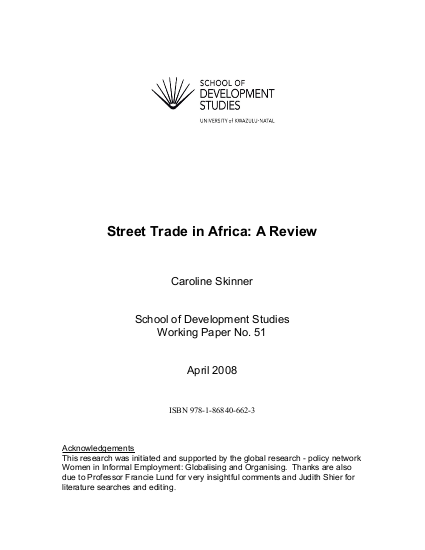
Despite the advances in modern retailing, millions of people throughout the world still make their living partly or wholly through selling goods on the streets. This is particularly the case in Africa. A vibrant array of traders selling everything from fruit and vegetables, to clothes, traditional medicine and even furniture is what characterises African cities. This paper, rather ambitiously, aims to outline broad trends about these activities in Africa. It hopes to assess what is known about this phenomenon in the continent and how it has been understood over time, with a view to assist in framing future research.
The paper is divided into four sections. The first section considers the theoretical lenses employed in analysing street trading in the academic literature. It starts by considering how street trade is dealt with in the debates of the 1970’s and 1980’s arguing that these debates still have resonance today. It then reflects on the conceptual tools increasingly being used – livelihoods and social exclusion and the implications of post-modern ways of understanding informality. The second section reviews street trade statistics. These are contextualised in urbanisation, migration and economic development trends. The little data that is available about street traders is reviewed. The evidence suggests that the surge in numbers of street traders, partly caused by economic restructuring processes, is likely to continue. The third section concentrates on trends in policy, planning and governance. Research on the issue suggests that state responses to street trading form a continuum from violent sustained evictions on the one side, to a more inclusive approach on the other. Having reviewed the empirical evidence, cross-cutting themes are identified that are either important in understanding processes of inclusion and exclusion of street traders and/or factors to consider in future research and advocacy. What is clear from Section 3 is that the processes of incorporation or exclusion of street traders is part of everyday political struggle. The ways in which street traders are organised, articulate their concerns and wield power, is therefore critical. The fourth section thus concentrates on trends in street trader organisation.
Resource collections
- UN Habitat - Urban Response Collection
- Urban Response - Urban Crisis Preparedness and Risk Reduction
- Urban Response Collection - Community Engagement and Social Cohesion
- Urban Response Collection - Economic Recovery
- Urban Response Collection - Environment and Climate Change
- Urban Response Collection - Housing, Land and Property
- Urban Response Collection - Urban Crisis Response, Recovery and Reconstruction
- Urban Response Collection - Urban Resilience